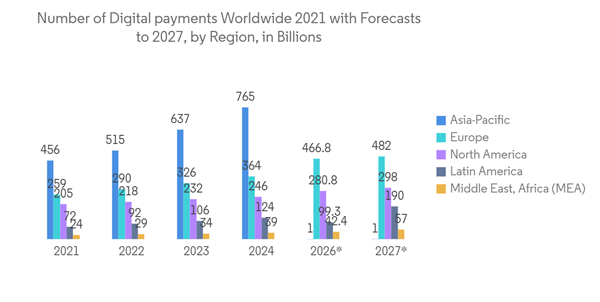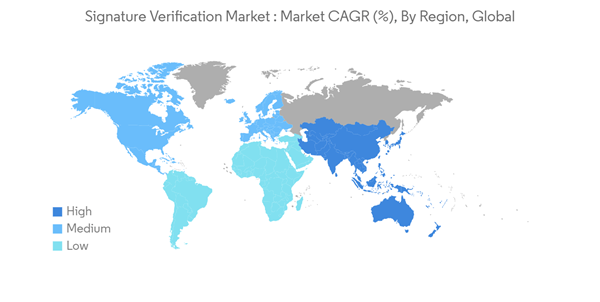In order to authorise transactions and documents, signatures are especially applied by authorities like governments, businesses and financial organisations for verification purposes. They provide a method of authentication based on the dynamic features of an individual's handwriting signature and its characteristics to verify their identity.
Key Highlights
- Automatic signature verification is an attractive field of research from both scientific and commercial points of view. In recent years, in line with continuous growth of the internet and increasing security requirements for development of an e-society, automatic signature verification is being considered since it uses a customary personal authentication method accepted at both legal and social levels.
- In order to protect banks and customers from fraudulent checks, the primary purpose of automated signature verification is to ensure that they are signed correctly. A number of banks automatically process checks at a specific value, putting them at risk of accepting forged checks. Then, they manually perform spot checks and look at checks over particular amounts, a process that ultimately wastes both time and money.
- In addition, the BFSI industry's main concern is end to end encryption and security. In order to provide a secure and accurate authentication system to address these concerns, the BFSI sector is increasingly investing in the market for signature verification.
- Handwritten signatures often use scanned signatures for verification, while online and dynamic systems majorly rely upon the signals captured from pen movement on a tablet or touchscreen. This provides more information compared to static images, such as pen speed and pressure.
- Also, the COVID-19 pandemic has developed a need for digital signatures in different industries. Recently, the Centers for Medicare & Medicaid Services authorized the use of electronic signatures under commonly accepted Washington State procedures.
Signature Verification Market Trends
Financial Services to Witness the Growth
- One of the main end users for the adoption of signature verification solutions is the financial services sector. Increasing counterfeiting, digital transformation and online transactions are among the trends that drive demand for these solutions within this sector.
- In addition, the pandemic has led to the digitisation of the financial services sector, which has encouraged the adoption of digital solutions to secure and protect assets.
- The number of cashless payments in Asia-Pacific is forecast to be higher than transactions in Europe and North America combined. This is according to research from Capgemini Research Institute for Financial Services Analysis. In 2023 - the most recent year estimated by the source - 765 billion U.S. dollars in non-cash transactions were carried out in Asia-Pacific. Europe and North America followed, with 364 and 246 billion U.S. dollars in transactions respectively.
- In order to facilitate compliance and reduction of workload, while at the same time ensuring that KYC requirements are met as well as a more accurate risk assessment, automation in document identification through location, extraction or validation is used.
- The signature verification software from Parascript checks signatures against those involved in fraudulent transactions. It provides signature verification with high accuracy. Also, it enables signature authentication where it is crucial to detect signature fraud.
Asia-Pacific is Expected to Witness Growth
- The growing incidence of security and transaction fraud, which leads to a need for highly secure identification and personal verification technologies, is one of the main factors driving growth in Asia Pacific's signature verification market.
- Moroever, The widest variety of digital services in Asia can be found in Singapore, which is one among the world's most advanced countries when it comes to internet banking. In the world, Singapore is second to none when it comes to Digital Banking inclinations. However, Singapore is also vulnerable to cyber attacks due to a growing number of multinational companies in the city.
- There has been a growing need for sign verification and authentication platforms in India and China due to an increase in fraudulent signatures. In developing economies, such as India, signature forgery and counterfeiting are leading to major policy failures and legal compliance measures, such as money and benefits, are being diverted to the wrong people, resulting in severe economic strain.
- The PRC Electronic Signature Law regulates the legality and admissibility of eSignatures in China. Moreover, in India, under the Information Technology Act, Aadhaar-based e-signatures possess the same legal compliance and validity as handwritten signatures.
Signature Verification Industry Overview
The signature verification market is semi-consolidated, with top players have being occupying a significant share of the market. New players find it challenging to enter the market due to the dominance of existing players such as Biometric Signature ID (J C Lads Corporation), CERTIFY Global Inc., Ascertia Ltd., Kofax Inc., Entrust Datacard Corporation, Odyssey Technologies Limited, and Scriptel Corporation.- In October 2023, Jumio has intoduced Jumio 360° Fraud Analytics for advanced fraud checks and the identity transaction will also be compared to the clusters and generate a predictive fraud score that can be used to automatically reject the transaction if it exceeds a certain threshold.
- In July 2023, Veriff, a global identity verification provider company, announced a collaboration with Taktikal, an e-signature software suite, to offer enhanced identity verification capabilities for their consumers globally. With this collaboration, Veriff adds an extra layer of security and safety to Taktikal’s automated onboarding and workflow processes through the enhanced authentication of digital signatures, enabling Taktikal to expand its customer base to new geographic regions.
Additional Benefits:
- The market estimate (ME) sheet in Excel format
- 3 months of analyst support
This product will be delivered within 2 business days.
Table of Contents
Companies Mentioned (Partial List)
A selection of companies mentioned in this report includes, but is not limited to:
- Parascript LLC
- Ascertia Ltd
- Jumio Corp.
- Ekata Inc.
- IBM Corporation
- SutiSoft Inc.
- Acuant Inc.
- Mitek Systems Inc.
- CERTIFY Global Inc.
- Scriptel Corporation
- iSign Solutions Inc.
- Veriff










